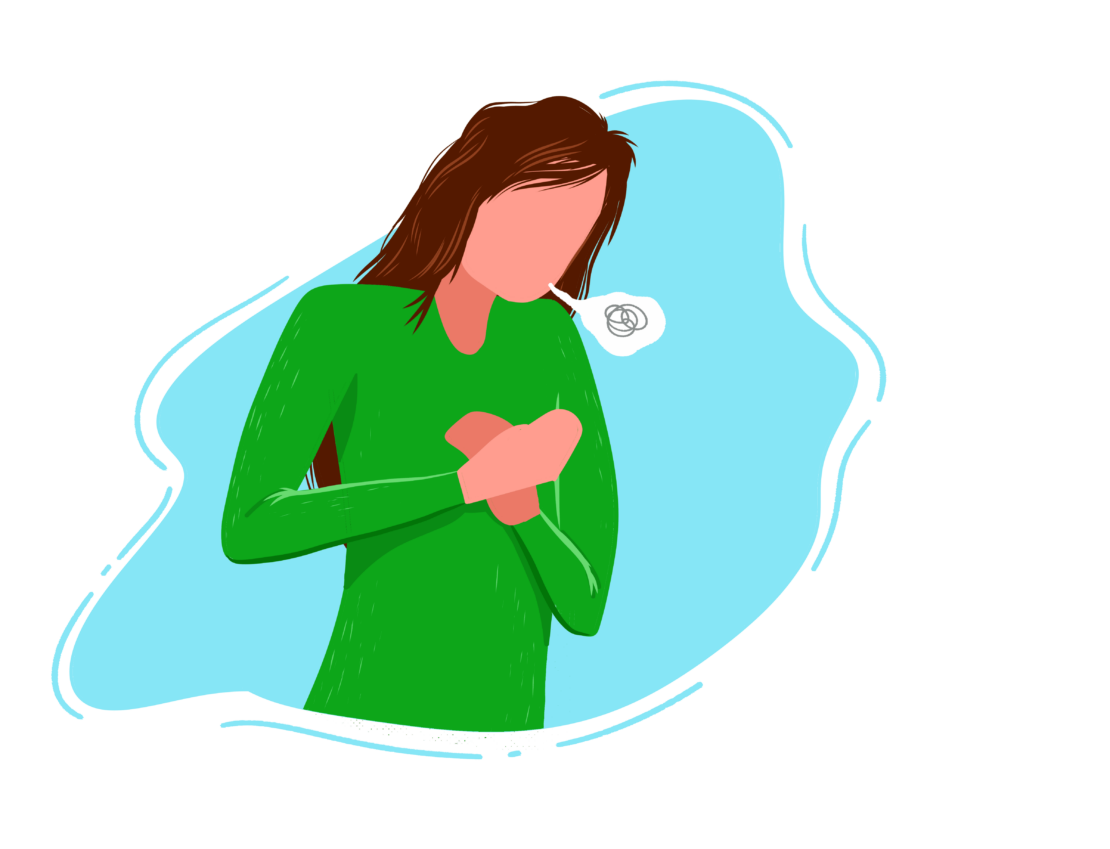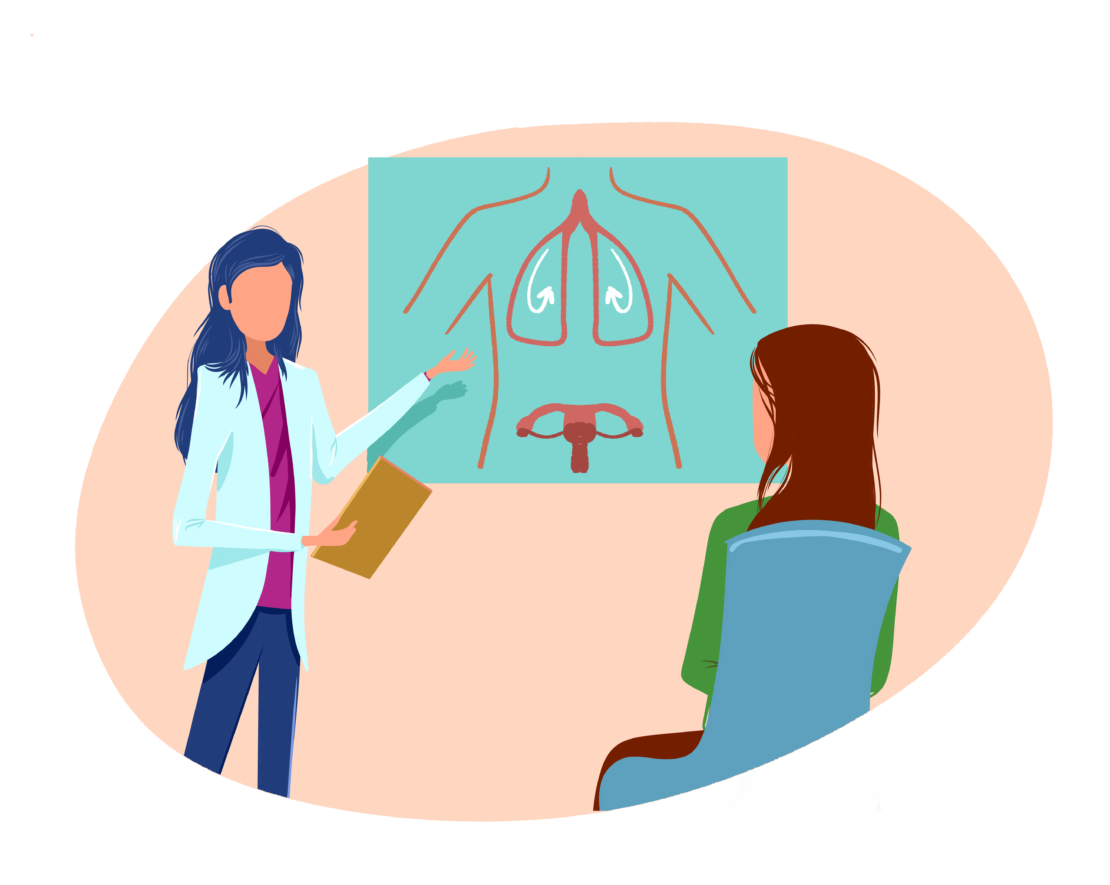Breathing difficulties (clinically known as dyspnea) are a symptom of menopause that approximately 20% of women experience. The main culprit is the drop in oestrogen levels, which affects respiratory and lung function; this of course makes breathing more difficult.
Treatments like HRT and particular lifestyle adjustments are excellent solutions to assist women in managing this symptom.
In this article we’ll cover this menopausal symptom in detail and learn about what can be done to treat.
What Causes Menopausal Shortness of Breath?
Breathlessness, also called Dyspnea in clinical terms, can be a symptom of menopause that results from hormonal changes affecting the respiratory system. Changes in oestrogen levels can affect lung function, resulting in shortness of breath and trouble breathing.
A study published in the American Journal of Respiratory & Critical Care Medicine suggested that the reason for this is due to inflammation in the body.
Oestrogen plays a significant role in how our bodies manage inflammation. But the way it acts can depend on a lot of things – like the type of inflammation, which cells are involved, where in the body it’s happening, and even the body’s metabolism. Because of all these factors, oestrogen can sometimes reduce inflammation, but other times it can actually make inflammation worse.
This complex interaction between hormones and inflammation could be one of the reasons why some women experience a decline in lung function during menopause.
Another study published in the European Respiratory Journal explained that while the decrease in lung function that some women experience after menopause is still a bit of a mystery, it could be linked to changes in sex hormone levels or an increase in insulin resistance after menstruation stops.
One theory is that when menstruation stops, a woman’s body might not be as good at getting rid of toxins, which could lead to harmful chemicals, like those found in cigarette smoke, building up in the body. These chemicals could then harm the lungs.
Having treated menopausal patients at OMC for over 2 years, a common denominator the doctors and nurses here have seen is that balancing and optimising all female hormones (estrogen, progesterone and testosterone) is the most effective treatment option.

Treatment for Shortness of Breath During
Menopause

Below we’ll explore a rundown of some of the most effective strategies that doctors and nurses at OMC recommend to patients to help tackle breathlessness during Menopause.
Clinically Approved Treatments
- HRT – This treatment can be a very effective solution to breathlessness – it works by replacing the hormones that your body starts to produce less of during menopause, like oestrogen and progesterone. This helps your lungs work better making it easier for you to breathe.
- Before taking action and getting any treatments, it is best to consult with a medical professional first to get professional medical advice. Our menopause experts at OMC can also give you professional advice on your concerns pertaining to menopause and suggest the best treatment option for you.
Lifestyle Changes
- Regular Exercise – this can help you breathe more effectively by strengthening the muscles involved in breathing and enhancing cardiovascular health.
- Smoking Cessation – early cessation from smoking will help keep you away from the risk of COPD, heart diseases, and even lung cancer. Aside from that, it will also improve your oxygen levels and lung function.
- Healthy Diet – A nutritious diet helps to maintain your heart and lungs in good shape because certain vitamins, minerals, and nutrients, such the antioxidants in fruits and vegetables, can improve lung function by preventing cell damage.
Here at OMC, we generally advise patients who are going through menopause with breathing difficulty to consider balancing hormones with biologically identical hormones (body identical hormones). It’s advisable to seek help from a respiratory specialist if breathlessness is significant and/or does not improve.

How Do I Know If Shortness of Breath is Menopause Related?
Breathlessness symptoms during menopause often do not occur alone; this symptom often occurs together with several symptoms like hot flushes, night sweats, mood swings, anxiety, and vaginal dryness.
Since it’s estimated that approximately 80% of women experience symptoms such as hot flashes and night sweats, and only 20% experience breathing difficulties, there’s a high chance that you’ll experience some of the other early symptoms of menopause before experiencing shortness of breath.
Other Respiratory Related Issues During
Menopause
Aside from difficulty of breathing, there are some other respiratory issues you should also be concerned about during menopause:
Asthma
This is a chronic condition which is characterised by inflammation in the airways and chest tightness which leads to difficulty in breathing. In case of menopausal women, asthma has greater severity and can be hard to control due to the drop in oestrogen.
Asthma can develop even if there is no history of asthma in the family. It can show up as what they call “non-allergic” asthma, which is tied to a specific type of inflammation in your bronchial tubes. This was pointed out in a study from the University of Tunis El Manar.
Sleep-Disorder Breathing Severity
If you’ve ever found yourself feeling sleepy during the day even though you got a full night’s sleep, or you’re just not feeling rested when you wake up, this could be a sign of a condition called sleep-disordered breathing.
According to a study by the University of Wisconsin-Madison, sleep-related breathing problems got worse as women progressed through menopause.
Specifically, the issues were 21% more severe in perimenopause, 31% more severe in postmenopause, and 41% worse in women who were somewhere between peri- and postmenopausal. Plus, for each additional year a woman was in menopause, these problems got 4% worse.

Seek Professional Advice

Breathing difficulties during a women’s menopausal stage is not to be taken lightly. This symptom can pose a lot of problems in the foreseeable future if not taken care of. Worst case scenarios to consider would be complications with heart problems or even risk of having lung cancer. Thus, it is important to really keep your health in check.
Our Menopause experts at OMC are always available to assist you with your menopausal issues and will be there for you every step of the process.
Feel free to contact us here.
